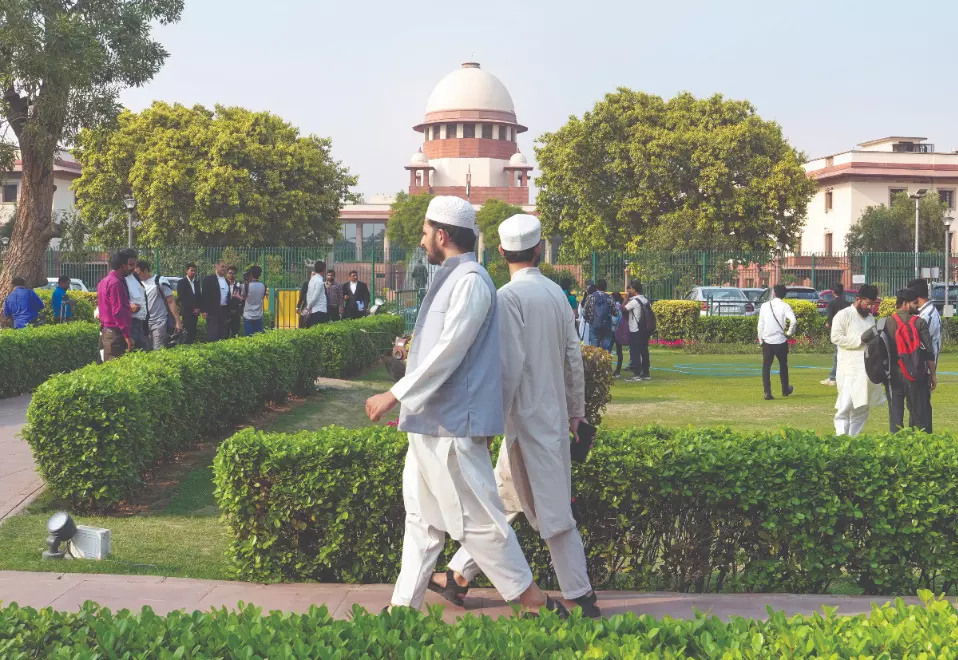
NEW DELHI, April 16 -- The Supreme Court, hearing the bunch of petitions challenging the Waqf (Amendment) Act, 2025, on Wednesday asked some hard questions on various provisions of the new law. The apex court asked if Muslims would be allowed to be a part of Hindu religious trusts.
It also proposed to stay certain key provisions of the contentious Waqf (Amendment) Act, 2025, including the power to denotify properties declared as waqf by courts. The top court proposed to pass the order, which was opposed by the Centre as it sought a detailed hearing before any such interim order.
The bench, which will continue with the hearing on Thursday, was miffed over the inclusion of non-Muslims in the central waqf councils and boards and asked the Centre whether it was willing to include Muslims in Hindu religious trusts.
The bench, led by Chief Justice Sanjiv Khanna and comprising Justice Sanjay Kumar and Justice KV Vishwanathan, was hearing 73 petitions challenging the new Waqf Act, which has sparked protests in several parts of the country.
Senior Advocate Kapil Sibal, appearing for one of the petitioners, submitted many provisions in the new law that violate Article 26 of the Constitution, which guarantees the freedom to manage religious affairs. Sibal also flagged the powers the new law gives to the Collector. He argued that the Collector is a part of the government, and if he plays the role of a judge, it is unconstitutional.
The bench then hinted at staying the provision of the amended law, which says a waqf property will not be treated as waqf during the inquiry of the collector to decide if the property is government land.
The CJI-led bench asked solicitor general Tushar Mehta, appearing for the Centre, how "waqf by user" can be disallowed, as many will not have requisite documents to get such waqfs registered.
"Waqf by user" refers to a practice where a property is recognised as a religious or charitable endowment (waqf) based on its long-term, uninterrupted use for such purposes, even if there isn't a formal, written declaration of waqf by the owner.
"How will you register such waqfs by user? What documents will they have?
It will lead to undoing something. Yes, there is some misuse. But there are genuine ones also. I have gone through Privy Council judgments also. Waqf by user is recognised. If you undo it then it will be a problem. Legislature cannot declare a judgment, order or decree as void. You can only take the basis," the bench said.
Mehta submitted there was a large section of Muslims who did not want to be governed by Waqf Act. The bench then asked Mehta, "Are you saying that from now on you will allow Muslims to be part of the Hindu endowment boards? Say it openly."
The apex court said when a public trust was declared to be a waqf 100 or 200 years ago, it couldn't suddenly be taken over by the waqf board and declared otherwise. "You cannot rewrite the past," the bench said.
The court proposed to order that the properties declared as waqf, including "waqf by user", won't be de-notified, but the Centre opposed the suggestion and sought a hearing before such a directive.
"The properties declared by courts as waqfs should not be de-notified as waqfs, whether they are by waqf-by-user or waqf by deed, while the court is hearing the challenge to the Waqf Amendment Act 2025," the bench said.
The top court said, "All members of the waqf boards and central waqf council must be Muslims, except the ex-officio members."
CJI Khanna also said one high court could be asked to deal with the pleas.
"There are two aspects we want to ask both sides to address. Firstly, whether we should entertain or relegate it to the high court? Secondly, point out in brief what you are really urging and wanting to argue? We are not saying there is any bar on SC in hearing, deciding pleas against the law," the CJI said.
Senior advocate Sibal referred to Waqf Amendment Act and said he was challenging the provision that says only Muslims could create waqf. "How can the state decide whether I am a Muslim or not and hence, eligible to create waqf?" Sibal asked.
He added, "How can the government say only those who have been practising Islam for the last five years can create waqf?"
Senior advocate Abhishek Singhvi, who represented some of the petitioners, submitted that Waqf Act would have all India ramifications and pleas should not be referred to the high court.
Senior advocate Huzefa Ahmadi, opposing Waqf Act, said Waqf by user was an established practice of Islam and couldn't be taken away.
About 72 petitions, including those by AIMIM leader Asaduddin Owaisi, All India Muslim Personal Law Board (AIMPLB), Jamiat Ulama-i-Hind, the Dravida Munnetra Kazhagam (DMK), Congress MPs Imran Pratapgarhi and Mohammad Jawed, have been filed challenging the validity of the Act.
The Centre, on April 8, filed a caveat in the apex court and sought a hearing before any order was passed in the matter.
The bench, which did not issue a formal notice as of now, said it would resume hearing on the petitions at around 2 pm on Thursday.
The apex court also observed that the violence occurring during protests against the Waqf (Amendment) Act is "very disturbing".
"One thing that is very disturbing is the violence that is taking place. If the matter is pending here, then it should not happen," the CJI said.
Echoing a similar sentiment, solicitor general Tushar Mehta, appearing for the Centre, said, "They (protesters) think they can pressurise the system by this."
Kapil Sibal opposed the submissions of the law officer and said, "Who is pressuring who? We don't know."
The CJI then said there were "positive points in the bill" that should be highlighted.
Published by HT Digital Content Services with permission from Millennium Post.
